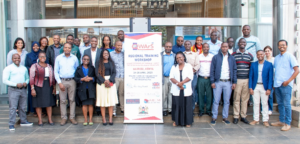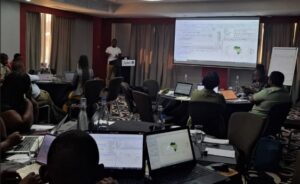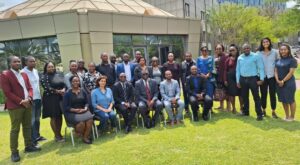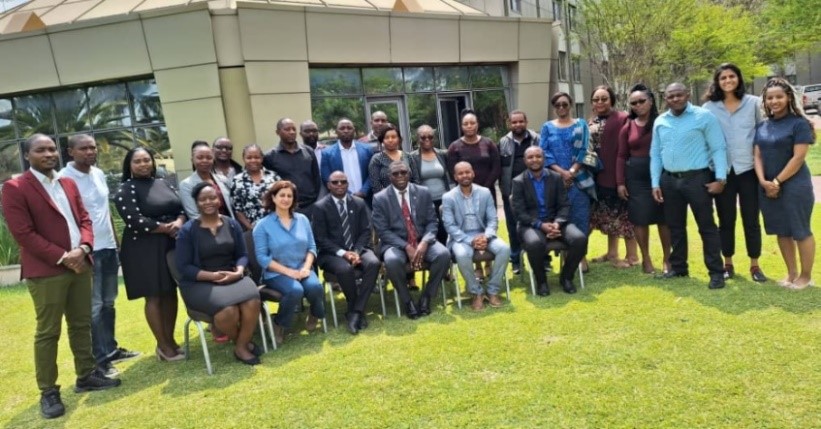

Two regional workshops, one in Nairobi, Kenya, in April and the other in Lusaka, Zambia, in late August, brought together human and animal health epidemiologists, hailing from Eswatini, Ethiopia, Kenya, Zambia, Tanzania, Malawi, and Zimbabwe, to enhance their skills in the spatio-temporal analysis of antimicrobial resistance (AMR) and antimicrobial use (AMU) data. Under the Fleming Fund Regional Grant and in partnership with One Health Trust (OHT), the African Society for Laboratory Medicine (ASLM) supported the workshops as part of Phase I of the Qualifying the Workforce for AMR Surveillance (QWArS) in Africa and Asia initiative. This training used foundational, locally collected data and country-specific reports from the 14 African countries supported under the Fleming Fund-sponsored Mapping Antimicrobial Resistance and Antimicrobial Use Partnership (MAAP) project.
The primary goal of this regional training initiative was to empower epidemiologists with advanced skills for analysing AMR and AMU data, including specific training on the statistical software packages R and Stata, to help them to establish and maintain AMR surveillance systems. Participants learned how to generate AMR charts and tables using the OHT’s ResistanceMap surveillance network platform, estimate the Drug Resistance Index at the facility and national levels, identify and analyze potential AMR risk factors, interpret data associations and develop targeted local and national strategies to combat AMR.


In addition to these skills, participants gained expertise in working with spatial data types. They were trained in generating and interpreting risk maps using Geographic Information System (GIS) techniques in the R software. Furthermore, they explored building models of infectious diseases in R and integrating intervention effects into these models. This comprehensive training approach ensures that epidemiologists are now well- equipped to support in-country AMR and AMU data analysis, making a substantial contribution to the generation of country-specific reports and AMR surveillance efforts.
The completion of these regional workshops marks a significant milestone, with 37 epidemiologists now armed with advanced data analysis techniques and GIS mapping skills tailored for AMR and AMU data. This highly skilled workforce of epidemiologists is poised to provide invaluable support for ongoing AMR and AMU data analysis, ultimately playing a pivotal role in the generation of country-specific reports and the continued success of AMR surveillance efforts.
………………
About QWArS
The Qualifying the Workforce for AMR Surveillance in Africa and Asia (QWArS) project aims to address AMR’s challenge by building AMR surveillance capacity among laboratory and epidemiology professionals from the human, animal, food and environmental health sectors. As part of this process, QWArS aims to establish competency standards fit for the context of African and Asian settings, providing the knowledge and skill baseline for AMR surveillance training programs to work with. QWArS is being implemented in 14 African and 3 Asian countries and is led by the African Society for Laboratory Medicine and its partners: the Africa Center for Disease Control; the American Society for Microbiology; the Institut Pasteur International Network; the Institut de Recherche en Santé, de Surveillance Epidémiologique et de Formation; Foundation Mérieux; International Centre for Diarrhoeal Disease Research, Bangladesh; and the National Food Institute, Technical University of Denmark.
About the African Society for Laboratory Medicine (ASLM)
ASLM is an independent, international, not-for-profit organisation founded in March 2011 in Addis Ababa that coordinates, galvanises and mobilises relevant stakeholders at the local, national, and international levels to improve local access to world-class diagnostic services and ensure healthy African communities now and for the long-term. ASLM is the first pan-African society for laboratory professionals, endorsed by the African Union (AU) and supported by multiple African Ministers of Health through its Ministerial Call for Action. https://aslm.org
About the Fleming Fund
The Department of Health and Social Care (DHSC)’s Fleming Fund is a UK aid programme supporting up to 25 countries across Africa and Asia to tackle antimicrobial resistance (AMR), a leading contributor to deaths from infectious diseases worldwide.
The Fleming Fund invests in strengthening AMR surveillance systems through a portfolio of country grants, regional grants and fellowships managed by Mott MacDonald, and global projects managed by DHSC. Flemingfund.org / @FlemingFund

